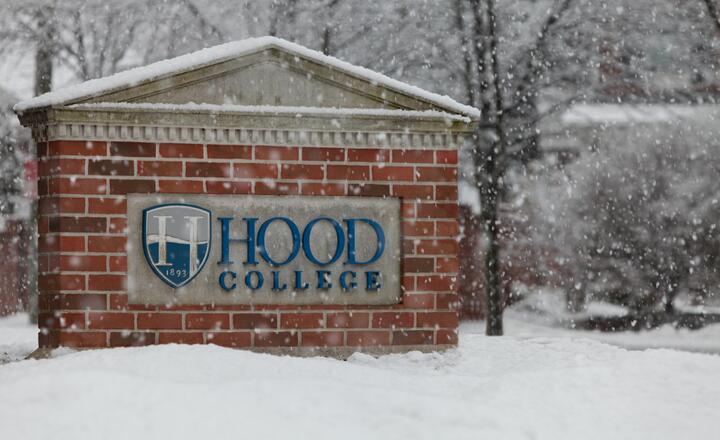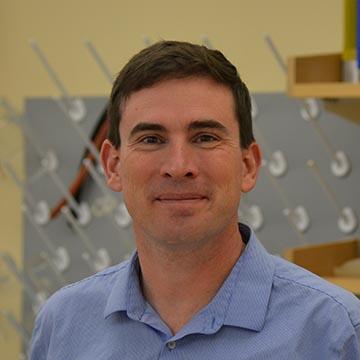
Academic Innovation Grants
Academic Innovation Grants
The Academic Innovation Grant funds innovative projects that are designed to support specific strategic initiatives related to teaching and learning. Former Academic Innovation Grant recipients have created libraries of instructional videos, collaborated with students to create course materials, and developed unique ways to engage students who are learning remotely.
Successful applicants will receive up to $2500 in sponsorship of a project related to one or more of the initiatives listed below. The application deadline is March 29, 2026.
Objectives
- To encourage faculty to develop innovative teaching strategies to enhance teaching and learning;
- To incentivize specific strategic initiatives that make learning more accessible and engaging to a diverse student population;
- To provide support for projects that enhance the scholarship of teaching in Hood’s academic disciplines.
Strategic Initiatives
All applications must align with one or more of the following initiatives related to teaching and learning:
SI 1: Accessibility and Universal Design for Learning
Projects submitted under the Accessibility and Universal Design for Learning initiative will focus on transforming the materials, environment, or approach of teaching to accommodate the needs and abilities of all learners.
SI 2: High Impact Practices
Projects submitted under the High Impact Practices initiative will sustainably integrate one of the following experiential HIPs into a course: internships, undergraduate research, community-based learning, capstone courses, or global learning. Successful applicants will clearly articulate how their proposal connects to a high-impact practice and demonstrates one or more of the eight key HIPs features.
SI 3: Inclusive Teaching
Projects submitted under the Inclusive Teaching initiative should demonstrably show how their goals foster social justice, improve classroom climate, value diverse social identities, and promote pathways to participation for underrepresented groups.
SI 4: Open Pedagogy and Open Educational Materials
Projects submitted under the Open Pedagogy and Open Educational Resources initiative should show how the applicant will do one of the following: replace an assigned textbook with an existing OER; adapt, update, or combine existing OER into a new resource; create an original OER; or integrate open pedagogy into a course to support student engagement and learning. For more information about how to incorporate OER into a course, faculty should review the library’s OER guide and consult with their liaison librarian. Priority will be given to proposals that engage with best practices around accessibility, equity, and representation.
SI 5: Innovative Use of Technology
Projects submitted under the Innovative Use of Technology initiative will creatively integrate new programs, learning platforms, databases or online archives, and/or devices into a course. Applications should demonstrate how this new technology will be deployed to enhance students’ information literacy, introduce new forms of engagement or assessment into the classroom, or get students to critically engage with new sources of information or machine-learning.
Benefits
Successful applicants will receive up to $2,500 for a project designed to enhance teaching and learning. Funding may be provided in the form of reimbursement for expenses (such as technology, experiences, materials, speaker fees/honoraria, or relevant professional development) or in the form of taxable compensation.
Eligibility and Responsibilities
Applicants must be annual contract (.5 or greater) faculty at Hood College. Faculty who are awarded a Board of Associates or Summer Research Institute grant are not eligible for this grant opportunity in the same fiscal year. The Academic Innovation Grant does not support new courses or new curriculum development.
In accepting a grant, the faculty member agrees to:
- Submit an electronic final report (maximum 500 words), including a financial report, to the CTL Advisory Board by January 2025 or May 2025, depending on when the project is implemented and evaluated.
- Write a short description of the grant work for the CTL website.
- Continue to work at Hood College for at least one year after completion of the grant work.
How to Apply
All 2026-2027 Academic Innovation Grant applications should be submitted by March 29, 2026. Your application should include:
- A proposal abstract (maximum of 100 words).
- A proposal narrative, which should include the project's goals/objectives, methods, budget, timeline, assessment, a clear connection to at least one of the five strategic initiatives, and the potential impact on students at Hood (maximum 1000 words).
- Course syllabi or other appropriate curriculum materials in support of the project (optional)
The committee will review applications in early April 2026.
Ready to apply? Upload your materials using the application form.
Previous Academic Innovation Grant Awardees
Sangeeta Gupta, Ph.D., Assistant Professor of Psychology
OER Curriculum for Research Methods

With the support of the Academic Innovation Grant from Hood College’s Center for Teaching and Learning, I spent Summer 2024 creating an open, no-cost curriculum for the two-semester Research Methods sequence in Psychology. This project was driven by two barriers I had observed in the classroom. First, there was no single, comprehensive resource that guided students through every stage of the research process in a practical, step-by-step way, in a way that modeled the iterative, real-world nature of research. Second, I believe in the importance of open access and equity in education, and was aware of the growing cost and limitations of traditional textbooks. By designing an open, no-cost curriculum, I was able to integrate scaffolding and authentic assessments, while providing my students with equitable access to all necessary resources.
Using a backwards design approach, I began by asking what I wanted students to leave the course with, and then built the path to get them there. I knew that by the end of the two-semester course, I wanted my students to have a solid research study that they were proud of, and were able to share their findings through written reports, oral presentations, and posters. Over the summer, I created a set of materials guiding students step by step through the research process: conceptualizing a study, developing a proposal, navigating ethical and IRB processes, gathering stimuli, programming the study in Qualtrics, choosing appropriate analyses and pre-registering their plan, recruiting participants, collecting data, analyzing data in Excel and SPSS, and preparing a manuscript for submission, all while applying open science principles. Rather than relying on a traditional research methods textbook, which is often abstract and theoretical, these resources are modular, practical, and directly tied to the learning objectives of the class.
This structure has also noticeably shifted the classroom culture: students engage more actively, support each other, and recognize the direct connection between their daily work and their final project. By eliminating textbook costs, every student began the semester with full access to resources from day one. Feedback has highlighted both the financial relief and the clarity of the materials. Students consistently describe the curriculum as approachable, organized, and helpful in demystifying research.
For me as an instructor, the grant allowed me with the space and flexibility to experiment with innovative approaches, reflect on what worked, include students as active partners in their learning process, and iterate further. The OER curriculum continues to evolve each semester as I refine modules based on student feedback.
With guidance and support from Hood College’s incredible librarians, this project also provided the groundwork my application to Maryland Open Source Textbook (M.O.S.T.) Faculty OER Grant Program in 2025 with the goal of publishing and sharing these materials more broadly. Although I was not awarded that grant, the process itself was valuable, pushing me to organize, document, and assess the curriculum in ways that strengthen its long-term sustainability. I plan to continue pursuing opportunities to expand and publish the resource so that it can benefit not only Hood students but also the wider academic community.
Kevin Bennett, Ph.D., Professor of Chemistry
Improving Student Learning Through a Course-Based Undergraduate Research Experience (CURE) in the Analytical Chemistry Lab

A Course-Based Undergraduate Research Experience (CURE) was developed for the Analytical Chemistry Laboratory (Chemistry 215L) in the Department of Chemistry and Physics. CUREs are an alterative to traditional prescribed laboratories that allow students to develop foundational skills over a more traditional cookbook type laboratory course.
The developed CURE uses student focused and developed research projects that are of interest to them but also expose students to a range of laboratory skills as the progress in their project. The CURE allows students to be in charge of project conception, lab procedure development, completion of work on the project in lab, and presentation of their research work to peers.
CURE projects have included:
- The Chemistry of Glow Sticks
- Analysis of Suspected Accelerants
- Analysis of Iron Fish
- Analysis of Calcium in Milk
Students were assessed based on their final project presentation and a written account of their work. Overall students were positive about the CURE approach to learning expressing their enthusiasm for their projects.
Robert Casas Roigé, Ph.D., and Adelmar Ramirez, Ph.D.
Today One Book for Hood, Tomorrow Open Works for All
Drs. Casas and Ramirez will work to replace all assigned textbooks for SPAN 101, 102, 201, and 202 with OER.
Amber Samuels, Ph.D.
Enhancing Clinical Supervision Through Sandtray Integration: An Innovative Approach to Counselor Development
Dr. Samuels will purchase sandtray materials to incorporate into the COUN 598 curriculum. Sandtray techniques integrate creative expression and symbolic representation into both clinical work and the reflective work of students.
Jackie Douge, MD, MPH, and Sherita Henry, DrPH, MPH
Amplifying Health: A Student-Led Podcast for Awareness and Engagement
Drs. Douge and Henry will work with students in PH 203 and PH 301 to create a podcast that tackles public health issues for the campus community.
Kimberly Morse Jones, Ph.D., and Nicole Pulichene, Ph.D.
All Hands on Deck!" Object-Based Learning for A&A Concentrators
Drs. Morse Jones and Pulichene will work with artists and local museum professionals to replace traditional textbooks and course materials with "object-based learning" in the art and archaeology curriculum.
Kristy Calo, Ph.D.
Supporting ECE and ELSP Students: OER Transformation for Two Education Courses
Dr. Calo will replace costly course materials with OER in an education course.
Are you ready to say Hello?
Choose a Pathway
Information will vary based on program level. Select a path to find the information you're looking for!
